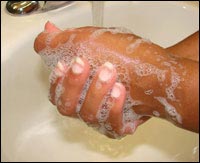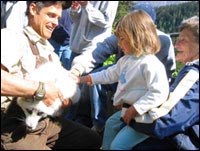Stay Healthy at Animal Exhibits This Summer
 There are many ways to explore the animal world. Follow these tips to help you prevent illness when visiting animal exhibits this summer.
There are many ways to explore the animal world. Follow these tips to help you prevent illness when visiting animal exhibits this summer.
Increased Cases of Flu Spreading from Pigs to Humans
CDC is monitoring a new influenza virus called H3N2v that has been found in U.S. pigs and has infected people too. Most of the people who’ve been infected have had exposure to swine at fairs. Learn how to protect yourself from H3N2v before you head to the fair.
From watching calf roping at the rodeo to petting goats at the county fair, there are many ways to explore the animal world. Exhibits such as petting zoos and fairs allow children of all ages to have the thrilling experience of coming face-to-face with animals. This interaction allows people to learn more about animals and helps to build an important human-animal bond.
Unfortunately, many people become sick every year because of a visit to an animal exhibit. It is important to remember that animals sometimes carry germs that are harmful to humans. When people forget to wash their hands after petting an animal, or bring food or drinks into an area where animals are exhibited, they are at risk for becoming ill. You can learn more about these germs and how they cause illness by visiting CDC's Healthy Pets Healthy People site.
Stay healthy this summer! Below are some tips to help you prevent illness when visiting animal exhibits.
If You Are Visiting an Animal Exhibit Wash Hands Often

- Find out where hand washing stations are located.
- Always wash your hands right after petting animals or touching the animal enclosure.
- Always wash hands upon exiting animal areas even if you did not touch an animal, after going to the toilet, before eating and drinking, before preparing food or drinks, and after removing soiled clothes or shoes.
- Running water and soap are best. Use hand sanitizers if running water and soap are not available. Be sure to wash your hands with soap and water as soon as a sink is available.
- See directions for washing hands.
Eat and Drink Safely
- Keep food and drinks out of animal areas.
- Food should be prepared, served, and eaten only in areas where animals are not permitted (with the exception of service animals).
- Do not eat or drink raw (unpasteurized) products, including milk, cheeses, and cider or juices.
- Do not share your food with animals.
- Remember; wash your hands before preparing food or drinks and before eating and drinking.
Keep Children Safe Around Animals

- Children younger than 5 years old always need adult supervision in animal areas.
- Never allow children to put their thumbs, fingers, or objects (for example: pacifiers) in their mouth while interacting with animals.
- Hand washing should be supervised.
- Do not take or use strollers, bottles, pacifiers, spill-proof cups, or toys in animal areas.
- Children younger than 5 years old, elderly persons, and persons with weakened immune systems should use special precautions when around animal exhibits. You can find out more about these precautions by visiting CDC's Healthy Pets Healthy People site.
If You Manage an Animal Exhibit Facility Design

- Design the exhibit so that animal areas are separate from areas where people may eat food.
- Use signs to state where the animal and food areas are located.
- Install hand washing stations at the exit of the animal exhibit. Make sure that some of the hand washing stations are low enough for children to reach.
- Use plain language and pictures to inform visitors on ways to keep safe and healthy when visiting animal exhibits.
Education/Information
- Encourage visitors to wash their hands after visiting and/or handling animals.
- Be aware that healthy animals can carry germs that might make visitors sick.
- Train staff and educate visitors about preventing disease transmission between humans and animals.
- Use a variety of methods to provide information to the public. For example, use brochures, signs, and verbal instructions. See an example visitor handout [PDF - 128 KB].
For more information on keeping your visitors healthy: Read the Compendium of Measures to Prevent Disease Associated with Animals in Public Settings, 2011.
More Information
- Educational Posters (available in English, Spanish, and French):
- Listen to this one-minute summary of recommendations [PODCAST - 0:59 seconds] to minimize the risk for infectious diseases and injuries when at state fairs, petting zoos, and pet stores.
- Listen to "Wash Your Hands if You Pet That Bunny [PODCAST - 7:15 minutes]", an audio report that presents recommendations for minimizing health risks to visitors to state fairs, petting zoos, and pet stores, as well as to public health officials and animal handlers.
- Listen to "I Love Petting Zoos! [PODCAST - 3:27 minutes]", a Kidtastics podcast that helps children learn about how to stay safe and healthy when visiting petting zoos and other animal exhibits.
- Send a Teach Hand Washing Health-e-Card to a friend or family member.
- Visit CDC's Healthy Pets Healthy People site for more information on how you and your pet can stay healthy.
- Read the Compendium of Measures to Prevent Disease Associated with Animals in Public Settings, 2011 [PDF - 1.33MB]
- Appendix A: Animals in Public Settings: Guidelines for Venue Operators and Staff Members
- Appendix B: Suggested Sign or Handout for Visitors to Petting Zoos
- Appendix C: Hand-Washing Recommendations to Reduce Disease Transmission from Animals in Public Settings
- Appendix D: Guidelines for Animals in School and Child-Care Settings
CDC works 24/7 saving lives and protecting people from health threats to have a more secure nation. A US federal agency, CDC helps make the healthy choice the easy choice by putting science and prevention into action. CDC works to help people live longer, healthier and more productive lives.
Get email updates
To receive email updates about this page, enter your email address:
Contact Us:
- Centers for Disease Control and Prevention
1600 Clifton Rd
Atlanta, GA 30333 - 800-CDC-INFO
(800-232-4636)
TTY: (888) 232-6348 - cdcinfo@cdc.gov



